Table of Contents
Eating fruits and vegetables has many health benefits by reducing the risk of chronic diseases. These fruits and vegetables vary diversely in the content of energy and nutrients. Your diet should involve at least four to five types of vegetables and two types of fruits daily. Choose different colors and varieties of fruits and vegetables for gaining maximum benefits.
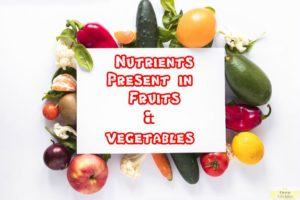
Before discussing the nutrient contents of fruits and vegetables, we should firstly know what nutrients are? Nutrients are those compounds in foods that are essential for our health. They provide us energy and responsible for regulating the chemical processes of the body. Six major nutrients are essential for our body to function properly. These nutrients are Carbohydrates, Lipids (Fats), Vitamins, Minerals, Protein, and water.
Carbohydrates
Carbohydrates are the sugars present in fruits, vegetables and grains. According to the National Institute of Health (NIH), an adult should consume 135 grams of carbs daily. The intake of carbohydrates should be around 45% to 60% of the total calorie content. However in diabetic patients and pregnant women the intake of carbohydrate content may vary. Carbohydrates provide energy for muscles and are considered fuel for central nervous system. There are both “good” carbs and “bad” carbs and you should know the difference between them. We get good carbs from fruits, whole grains, vegetables, etc, while highly processed foods, pastries, doughnuts, etc are likely to have bad carbs.
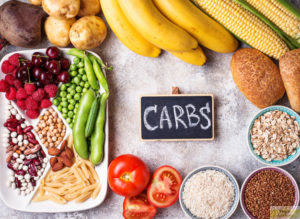
Fruits and vegetables rich in carbohydrates are:
- Sweet potatoes (23.61 g of carbohydrates in one cooked sweet potato)
- Beets (13 g in one cup raw beetroot)
- Corns (25 g in every 100 g of corns)
- Bananas (26.95 g in one banana)
- Apples (25.13 g in one apple)
- Mangoes (24.72 g in one mango)
- Blueberries (14 g in every 100 g of berries)
- Oranges (12 g in one orange)
Fats
They are one of the main macronutrients along with carbohydrates and proteins. Fats are the substance that keeps our skin healthy and are the main way the body stores energy. The main types of fats are saturated, unsaturated, polyunsaturated, trans fat and monounsaturated fats. The daily intake for fat in adults is 20% to 35% of total calories from fat. It provides more energy than carbs and proteins.
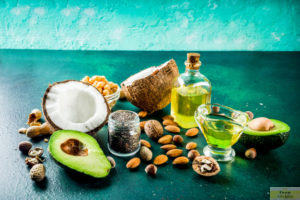
Most of the fruits are low in fat content. Fat content is rich in Cheese, dark chocolate, eggs, fish, buts, etc.
Here are some of the fruits and vegetables which are rich in fats are:
- Avocados: Avocados are loaded with fats, about 77% of fat.
- Coconuts: 89% of saturated fat.
- Olives: 11-15% of major monounsaturated fat.
- Soybeans: 11g in 1 cup cooked beans
Proteins
Proteins are the building blocks of organ, muscle, skin and hormones. The daily intake of protein should be 46g in women and 55g for men. The best sources of protein are dairy products, eggs, legumes, seeds and nuts, while we don’t count fruits and vegetables on the list.
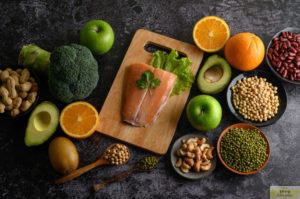
Here are some protein-containing fruits and vegetables:
- Guava: 4.2 g of protein per cup.
- Avocados: 4g of protein per cup.
- Jackfruit: 3g of protein per cup.
- Apricots: 2.2g of protein per cup of dried apricots.
- Kiwi: 2.2g per cup.
- Watercress: 0.8g of protein per cup (34g).
- Spinach: 1g of protein per cup (30g).
- Asparagus: 2.9g of protein per cup (130g).
- Broccoli: 2.6g of protein per cup (91g).
- Cauliflowers: 2g of protein per cup (100g).
Vitamins
Vitamins are the compounds that are needed in small quantities to sustain life. We have to take vitamins from foods as our body cannot produce enough of them. They are essential for the normal metabolism of the body. There are two major types of vitamins: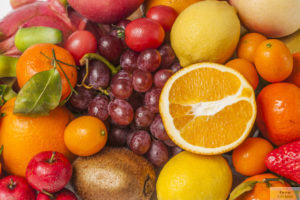
- Fat-soluble vitamins: These vitamins are stored in fatty tissues of the body. Vitamins A, D, E and K are fat-soluble vitamins. Fruits and vegetable rich in fat-soluble vitamins are:
Vitamin A: Carrots, Sweet Potatoes, Apricots, carrots, kale.
1. Vitamin D: (No plant-based foods produce Vitamin D)
2. Vitamin E: Spinach, Turnip greens, bell peppers, asparagus, avocado, mango.
3. Vitamin K: Kale, Parsley, Broccoli, Asparagus, Lettuce, prunes, kiwi, Avocado, pomegranate. - Water-soluble vitamins: These vitamins can’t stay in our bodies for a long time. Vitamin C and all the B vitamins cannot be stored by our body, and are soon excreted in urine.
Here are Fruits and vegetable rich in water-soluble vitamins are:
- Vitamin B: Banana, Citrus fruits, avocados, broccoli, spinach, watermelon.
- Vitamin C: Papaya, Citrus fruits, Broccoli, Strawberry, Kale, Dark green leafy vegetables.
Minerals
Our body needs both vitamins and minerals to function properly. Minerals include calcium and iron mainly found in milk, dairy foods, fruits and vegetables, nuts, etc.
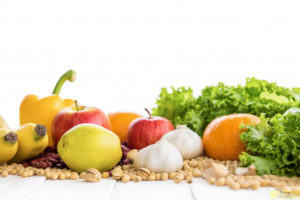
Here are Fruits and vegetables that are rich in minerals are:
- Apricots: Potassium is the most abundant mineral in apricot.
- Apple: Calcium, Potassium and phosphorus.
- Banana: Potassium
- Blackberries: Potassium, magnesium and calcium.
- Grapes: Calcium, Magnesium, potassium, phosphorus and manganese.
- Lemon: Calcium, Copper, iron and potassium.
- Pumpkin: Potassium, calcium, magnesium, beta-carotene.
- Tomato: Calcium, copper, iron, magnesium, manganese, phosphorus.
- Asparagus: Calcium, magnesium, potassium and manganese.
- Broccoli: Calcium, Copper, iron, manganese, zinc.
- Cabbage: calcium, copper, potassium, sodium.
- Green pepper: Calcium, iron, magnesium, manganese, potassium.
Water
Our cell body needs water to function properly. Fruits and vegetables a great source of water. Here are some of the water-rich fruits and vegetables which you should include in your diet.
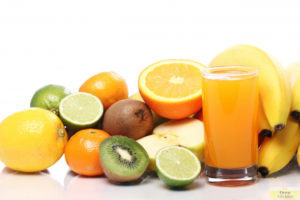
- Watermelon: 91% of water.
- Broccoli: 90% of water.
- Brussel sprouts: 88% of water.
- Oranges: 86% of water.
- Apples: 85% of water.
- Blueberries: 84% of water.
- Cucumber: 96% of water.
- Tomatoes: 95% of water.
- Spinach: 93% of water.
- Mushrooms: 92% of water.
Eating a healthy diet and including all these in your diet can reduce the risk of a certain type of disease. Sit at the table and enjoy your food on the plate half-filled of vegetables and fruits.

